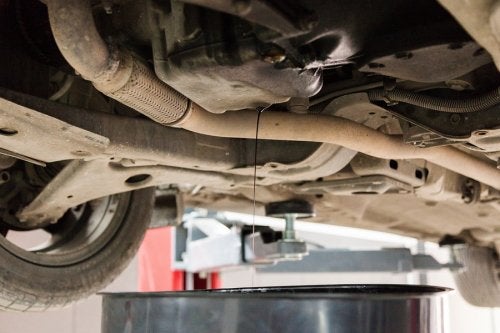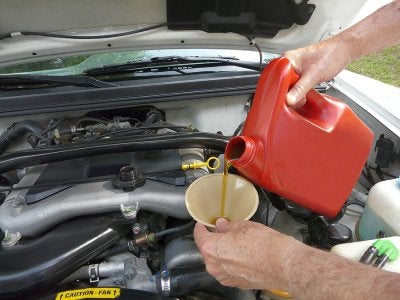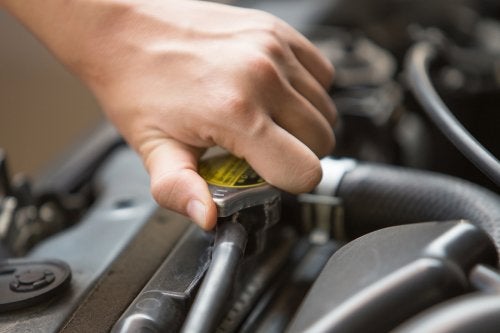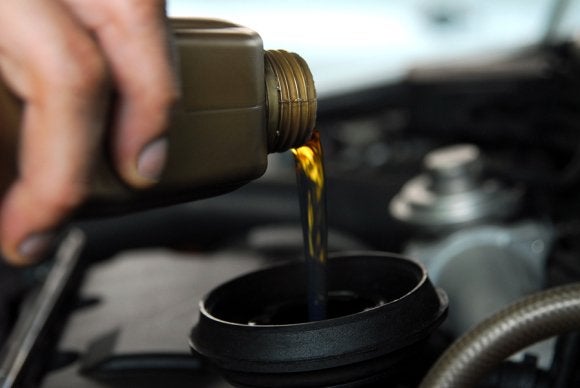-
When & How Often Should I Change My Oil?
This is a good question. Today’s cars are usually filled with synthetic oils. Most automotive manufacturers have varying opinions on oil change intervals. They may recommend oil changes every 10,000 to 15,000 miles. The proper synthetic oils can last that long, and often do. A problem arises when your vehicle is burning and actually consuming oil. Most of us assume that when a car uses or burns oil nothing is left behind. The reality is, when it burns off a portion of that oil remains behind. Motor oil, as with any other liquid, will evaporate. When it evaporates or burns off a portion of that oil remains behind as carbon and sludge deposits. It is like frying something in a pan. You add clear oil and begin to heat it up. The oil gets hot and will start evaporate. The oil is no longer clear, and you have black stuff stuck to your pan. That black stuff is carbon. What you see when your oil looks dark and is simply dirty carbon suspended in the oil. Those thick sticky carbon molecules attach themselves to internal engine components. Those deposits, over time, will block passages, increase wear and reduce performance & efficiency.
So back to the question “when and how often”? We recommend splitting that interval in half 5,000 to 7,500 miles. In the process, we flush that carbon, reducing the chance that it gets deposited on your car’s vital components. Carbon will still build up, because we are still are burning oil, but at a much slower rate.
What should be done about the carbon built up in our engine?
We recommend performing an engine oil flush with additives. Our Bluechem Premium Oil Service does just that. It breaks down those carbon deposits to a molecular level, encapsulates them, and suspends them in the oil. Then, when the oil is drained, it will flush out with the old oil. Other brands claim to do the same, but all they do is soften the carbon, allowing it to sluff off into the bottom of the oil pan. When the oil is drained, some of that carbon sludge comes out with the old oil. The rest remains in the bottom of your oil pan. It’s not ideal, and you can do much better with the Bluechem.
Does Bluechem Work?
I can tell you, I was a doubter. I do not believe in snake oil, and I really had a hard time believing the claims it made. We set up a trial at our shop and had Head of Operations for Bluechem U.S. demonstrate their product. We used my personal vehicle, which I drive on a daily basis. I am very familiar with how it drives & feels. We added 2 products, Bluechem Oil System Cleaner & Fuel System Cleaner. Bluechem not only believes that cleaning the sludge build up is important, but cleaning the carbon deposits in your combustion chambers is also crucial. This too is another source of carbon created by the engine and can end up in the oil. We drove my car for 15 minutes, came back, and drained the oil. Out came a stream of black oil, no clumps, in a steady flow. Even towards the end of the drain, we did not get a slow drip of thick oil. Instead, it was a slick quick drip of very liquid oil. We continued with the engine oil service, changing the filter and added the correct oil for my vehicle, Total Quartz 5/40 Full Synthetic.
Now came the proof I needed in order to sell this product. I got into my car and drove it, not believing I would not notice any difference. Instantly I noticed the engine was quieter, and seemed smoother. During the road test I even thought my engine had stalled, but instead, it was running so smooth & quiet that it almost didn’t feel like it was still running. Again, this is a car I drive on a daily basis so I know how it drove. At that point I believed. I was confident that this is a product was one I could stand behind. Bluechem doesn’t claim to increase or improve your engine’s performance and efficiency. Instead the only claim they make is it will help restore your engine back to it’s original performance and efficiency.
Final Recommendations
We recommend splitting those manufactures recommended oil change intervals in half, especially if you are having to add oil or your oil level is low between oil changes. We also recommend flushing the sludge, carbon deposits and contaminants with a product like Bluechem. Doing these things will help restore your vehicle’s efficiency, performance, and increase the lifespan of your engine.
-
Preserving the Life of Your Fuel Pump
You need fuel in order for your vehicle to operate, and your fuel pump is an integral part of the system. If you take proper care of your fuel pump, you might never have to bring it into the auto shop in Sacramento for replacement. Work with your auto mechanic to maintain your fuel pump—and your vehicle in general—regularly, and try not to run your tank dry. You should also make sure you only work with qualified auto mechanics and car repair shops to avoid damage to your fuel system. Read on for tips on preserving the life of your fuel pump.

Stick to a Maintenance Plan
If you want your vehicle to continue to run as well as it did the day you drove it home for the first time, you need to stick to a maintenance plan. This means that in addition to taking your car to the auto shop, you should do what you can to maintain the car on your own. Sometimes this means nothing more than looking out for problem signs and understanding how to treat your car properly. By working with your auto mechanic and taking care of your car on your own, you can extend the life of your fuel pump.
Don’t Empty Your Tank
Running out of gas is an inconvenience no matter how you look at it, but it can be particularly harmful for your fuel pump. Your gas is partially responsible for keeping your fuel pump cool, so it’s best to avoid dropping below a quarter of a tank. Additionally, more fuel in the tank means less work for the fuel pump, and fewer trips to the auto shop. Make sure you fuel up whenever you start getting low.
Only Work with Pros
A shoddy looking auto shop may be your only option when you’re in the middle of nowhere. However, you should always do your best to find an auto mechanic that you can trust. Corroded nozzles and watered down gasoline can negatively impact your fuel pump, so try to see a reputable auto mechanic.
-
What Does It Mean When Your Car Leaks Oil?
In order to take proper care of your car, you will want to pay attention to any leaks that may appear in your driveway after your vehicle has been sitting in park for any length of time. An oil leak is among the most common types of leaks that can affect German cars. If your car is leaking oil, this may indicate that it has a cracked seal or degraded engine gasket. Leaking oil can also cause other problems. Oil can get on hoses, belts, mounts & bushings, degrade the rubber. It can get in to electrical components & connectors & cause check engine lights. It can get on exhaust components & cause smoking & burning smells. To get to the bottom of what is causing your oil leak, you will want to make an appointment with a certified auto mechanic in Sacramento.
With service from a mechanic that specializes in German auto repair, you can make sure that your oil leak is not causing major damage to your engine. Your mechanic will have the tools that are needed to fully repair the oil leak and restore your engine to clean working condition. If you have recently spotted an unusual leak beneath your car, do not hesitate to schedule car repair services .

-
Is Your Engine Oil Bad?
A vehicle that gets an oil change in Sacramento when needed stands to be more effective and efficient than one that doesn’t, so you should be able to tell when your car is due. Regular oil changes keep your car operating the way it should, meaning you will have fewer problems to deal with over the long term. Watch this video on how to tell if your engine oil is bad.
Determining whether or not you are due for an oil change is not a particularly difficult process, and there are a few ways you can go about it. If you know you haven’t changed your standard oil in 4,000 miles or your synthetic oil in 6,000 miles, it’s probably time for an oil change.
We at Frank’s Automotive recommend splitting your Manufacturer’s recommended oil service interval in half. So if your Manufacturer recommends 15,000 miles before oil service, we recommend oil services every 7,500 miles. For clients who drive their vehicles sparingly and do not put 3,000 to 5,000 miles on their vehicle, the Manufacturer’s recommend once a year. For vehicles that are burning oil or oil looks sludgy, check out our Bluechem product .
-
The Importance of Regular Oil Changes
Whether you have just purchased a brand new car, or your vehicle is higher in miles, scheduling regular oil changes with your auto technician is one of the most important steps of car care. Without routine oil changes at a certified auto shop in Sacramento, the performance and efficiency of your vehicle will start to decline. A technician that specializes in German auto repair will be able to help you set up the right oil change and maintenance schedule for your vehicle. Let’s take a closer look at some of the top reasons why regular oil changes are so important for your vehicle.

Save Money Over Time
One of the top reasons why oil changes are so important is that these simple maintenance procedures can save you big bucks on repairs in the future. By taking the time to change your oil at regular intervals, you can avoid some of the maintenance problems that are associated with excessive wear and tear on your vehicle. Spending a bit of money on an oil change now will help you avoid costly repairs down the road.
Prevent Engine Damage
Without regular oil changes, your engine could become severely damaged. The moving parts of your car’s engine create a significant amount of friction when your car is in motion. When you schedule oil changes at your auto shop, your technician will swap out your used and dirty oil for a brand new product. With fresh oil, your engine will be able to run smoothly, without a risk of damage.
Boost Fuel Efficiency
Staying on top of your car’s oil change maintenance schedule may also help you boost the fuel efficiency of your vehicle. With regular oil changes, the internal components of your engine will be able to operate more smoothly and efficiently. As a result, your vehicle’s gas mileage ratings will be preserved over time. After learning about the importance of oil changes, be sure to set up an oil change procedure with a licensed technician in your area.
-
Checking Your Fuel Pressure
In order for your vehicle to continue to run safely and efficiently, it’s essential that the fuel that flows into the engine is properly pressurized. If your fuel pressure is lower than it should be, this will likely result in substandard performance. If you don’t have the pressure adjusted, it can even lead to damage to your engine. In order to avoid the need for engine repair at a Sacramento auto shop, it’s smart for every car owner to take the time to learn how to check fuel pressure—and when to do it.
What causes low fuel pressure? Low fuel pressure in your vehicle can be due to a number of causes. If you have a clogged filter, a defective or damaged fuel pump, or a malfunctioning regulator, it can result in inadequate fuel pressure. Whatever the cause is, however, it’s essential that you find out about your low fuel pressure right away.
When should fuel pressure be checked? As a rule, your fuel pressure should be checked every time you have a professional inspection. You should also check your fuel pressure any time that you observe any of the symptoms of a potential problem. Some common warning signs of a fuel pressure issue include unusually high fuel pressure, backfiring, and difficulty driving uphill. If you’re getting poor mileage, that may also be a sign that you have a fuel pressure issue.
How do you check your fuel pressure? Checking your fuel pressure is a quick and simple task. First, you’ll need to purchase a fuel pressure gauge. Be sure to have your vehicle owner’s manual on hand. Then, find the fuel pump test point on your vehicle and attach the gauge. Then, ask somebody else to start the engine while you look at the gauge. The gauge should come up to the appropriate reading for your vehicle, which you can find in your owner’s manual. If it doesn’t, then your fuel pressure isn’t at the right level.

-
Spotlight on Bluechem Premium Oil Service
When you purchase a luxurious European car, it is important to maintain your investment by bringing your vehicle to a top rated German auto repair facility in Sacramento. From a radiator flush to an oil change and more , your German car maintenance professional can provide you with a full range of services.
One of the car repair procedures that you may want to consider for your German car is the Bluechem premium oil change service. Unlike a conventional oil change, the Bluechem procedure is designed to fully clean, protect, and lubricate the sophisticated components in your engine. During the Bluechem premium oil service, your technician will take the time to fully clean out any gunk and grime that may have built up in your engine. Additionally, the unique Bluechem formula will also help to reduce your exhaust emissions by as much as 96%. If you are concerned about protecting your beautiful new European car, you should be sure to ask your mechanic about the advantages of Bluechem.

-
How Often Should You Change Your Oil
The old rule of thumb regarding oil changes (every 3,000 miles or three months) doesn’t necessarily hold up today. Although this is a great benchmark to stick to, modern engines and new oil additives and technologies have allowed drivers to go much longer in between oil changes. It depends on the age and condition of your vehicle, as well as the type of oil you put in the engine. Watch this video to learn more about oil change intervals.
To take the guesswork (and grease work) out of changing your car’s oil, bring it to a car repair shop in Sacramento. An experienced mechanic will be able to change the oil in your vehicle and get you back on the road in no time at all. When you visit an auto shop for the first time, ask the mechanic for a recommended oil change interval based on the age and condition of your engine. Your mechanic may recommend a different maintenance schedule from what’s in the owner’s manual based on the condition of your vehicle.
RECENT POSTS
categories
- Uncategorized
- Automotive
- automotive diagnostics services
- Frank’s Automotive
- auto shop
- oil change
- Auto mechanic
- Maintenance
- maintenance schedule
- Catalytic Converter
- Engine Light
- oxygen sensor
- Transmission Problems
- BMW
- Pre-Purchase
- Brakes
- Anti-Lock Brakes
- Auto Diagnostics
- Alternator Repair
- Slipping Transmission
- Engine Trouble
- Brake Sounds
- Frank’s Automotive
- Frank Lettini
Archives
2022
2020
2019
2017
2016
- December (4)
- November (5)
- October (4)
- September (4)
- August (4)
- July (4)
- June (4)
- May (4)
- April (4)
- March (4)
- February (4)
